Discovering an ideal website builder is critical to creating an impressive and functional online presence for small businesses, blogging platforms, or e-commerce stores. While selecting a perfect builder may seem overwhelming, modern website builders have significantly advanced in offering user-friendly interfaces, customizable templates, and features designed specifically to allow non-technical people to construct stunning sites without external assistance. Here are three leading website builder software options currently on the market: Wix, Squarespace, and WordPress. Each is an outstanding choice that offers unique advantages that may make them suitable for different situations or preferences.
Top 3 Gigs
Wix is an intuitive website builder designed for beginners, providing an easy drag-and-drop interface to create their websites visually. Build without needing coding knowledge – choose from over 500 designer-created templates to match your brand’s aesthetic! Wix provides robust features, such as its app store offering over 400 extensions to extend functionality – such as e-commerce tools, booking systems, and social media integration – which set it apart from their competition. Wix’s artificial design intelligence (ADI) makes website creation straightforward with just a few straightforward questions, making it perfect for individuals and small businesses looking to quickly launch professional-looking sites without breaking a sweat over them.
Squarespace is widely recognized for its eye-catching designs and high-end templates, making it the go-to platform for photographers, artists, and designers looking to present their work in its best light. Not only are its templates visually pleasing, but they are also fully responsive and look good regardless of which device someone views them from! Plus, its user-friendly editing interface allows users to move elements around freely compared to many other solutions, making Squarespace unparalleled! And finally, with powerful SEO and eCommerce features included – Squarespace becomes indispensable!
Furthermore:
WordPress.com brings together the benefits of self-hosted and managed platforms for maximum flexibility and ease of use. It offers customization capabilities with thousands of themes and plugins to meet user requirements for their sites. With SEO tools, social media integration capabilities, eCommerce capabilities, and expansion potential – WordPress’ flexibility also makes it ideal for bloggers or small businesses seeking SEO tools, social media integration features, or eCommerce capabilities to expand. It scales nicely to accommodate small sites looking for growth potential.
Deciding upon the ideal website builder software depends heavily upon your unique requirements and technical abilities.
Wix provides intuitive use for novice users, while Squarespace features professional templates explicitly tailored for creatives, and WordPress.com boasts extensive customization options that make advanced functionality accessible. Awareness of these platforms’ strengths will simplify selecting one to meet your goals – leading to a fantastic website!
List Of Top 10 Website Builder Software
Building websites is not easy, thanks to website builder software platforms that make creating any site simple – from e-commerce and blog platforms through blog software. Finding an ideal provider is critical; here are 10 of the best website builder programs with features tailored specifically for different needs.
List here
1. Wix: Wix is an intuitive drag-and-drop website builder offering various customizable templates, providing maximum customizability and flexibility to its users. Furthermore, its app market provides additional functionalities and integrations, making Wix an excellent solution for small businesses and personal websites.
2. Squarespace: Squarespace has long been recognized as the go-to solution for creative professionals seeking visually attractive website templates and designs, making it the go-to solution. Plus, with 24/7 customer support services included as part of their all-in-one offering, this truly makes this service all-inclusive!
3.WordPress.com WordPress.com is an intuitive site administration platform designed for site administration that offers both power and simplicity, customizable themes for various types of sites and SEO tools, and social media integration features suitable for blogs and business sites.
4. Shopify is an e-commerce website builder offering powerful sales tools for managing product inventory, multiple payment gateways, customizable themes, and integration with various apps, with 24/7 support that provides greater insight.
5. For beginners seeking an intuitive drag-and-drop website builder, Weebly offers an effortless experience featuring built-in e-commerce tools and responsive design templates. Plus, they offer a free plan with basic features suitable for smaller websites and marketing tools to expand online visibility.
6. Hostinger is an affordable website builder powered by artificial intelligence tools that offers customizable templates tailored specifically for different industries and purposes, including e-commerce functionality and SEO optimization tools – perfect for small businesses or startups on tight budgets.
Furthermore:
7. Jimdo
Jimdo offers an intuitive user experience to quickly build websites, with AI-driven design assistance and mobile responsive templates for freelancers and small businesses.
8.BigCommerce is a sophisticated e-commerce platform tailored to the needs of growing businesses, featuring advanced product and payment management features, SEO tools, multichannel selling capabilities, comprehensive analytics reporting, and 24-7 support services.
9. Webflow is an innovative visual content management system offering flexible design features and extensive customization without the need for code snippets. In addition, Webflow provides hosting, SEO tools, and e-commerce capabilities – making it an excellent solution for beginners and more experienced users.
10. Duda: Duda is renowned for its responsive design capabilities and speed. It features a drag-and-drop editor with team collaboration tools, and client management features such as client analytics, making it ideal for concurrent web professionals managing multiple websites.
Finding the ideal website builder depends on your requirements and goals; here are ten website builders designed to assist in building professional and effective web presences; each platform boasts unique benefits that make choosing one easier.
Reviews Of Best Website Builder Software
Website builders have revolutionized how individuals and businesses create an online presence. These tools offer advantages that make them appealing to those with extensive technical or coding knowledge and who wish to construct sites without needing an abundance of technical skills, with their user-friendly interface enabling even novice users to rapidly produce professional-looking sites quickly.
They offer users pre-designed layouts and templates to save time and effort in creating websites while still allowing them to customize these templates according to their unique needs for a personalized web experience.
Website builders offer users easy-to-use drag-and-drop functionality, making building websites accessible even for non-coders. Users can quickly arrange elements without programming knowledge, speeding up website creation. Moreover, website builders tend to be cost-effective – some even offer low-cost options that fit within tight budgets.
Site builders provide hosting services, making going online much simpler while assuring compatibility between design and hosting elements. In addition, responsive design capabilities ensure websites look good across devices from desktop computers and laptops to tablets and smartphones – an indispensable feature in today’s mobile-centric society.
Website builders provide users with many features and tools to optimize website functionality, such as e-commerce capabilities, blogging platforms, and integration with social media networks. It enables them to build engaging sites that produce results while engaging visitors simultaneously.
Wix
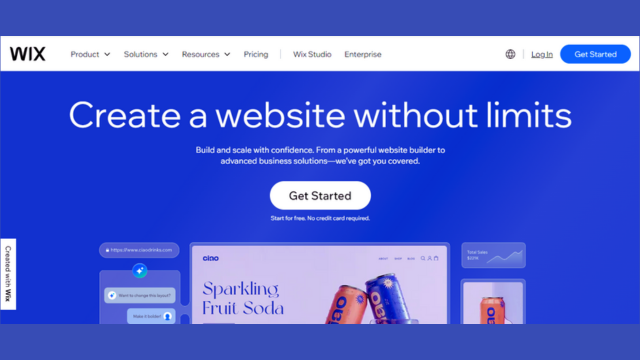
Wix has established itself as one of the leading website builders, catering to users with varying technical expertise. It is a popular option for individuals and businesses due to its powerful features and user-friendly interface. With Wix, users can create stunning websites without needing extensive coding knowledge. Below are some key advantages of using Wix as your website builder.
Intuitive Drag-and-Drop Interface
Wix offers an intuitive drag-and-drop interface, simplifying website creation. Users can quickly move elements around, achieving their desired layout. This functionality empowers users to design with creativity and precision.
Extensive Template Selection
Wix provides an extensive selection of templates across various industries. Each template is professionally designed, ensuring a polished and modern look. Users can effortlessly alter these templates to reflect their brand perfectly.
Advanced SEO Tools
Wix includes advanced SEO tools to enhance website visibility. These tools help optimize your site for search engines, improving organic traffic. Users can effortlessly modify meta tags, alt text, and other SEO elements.
Robust App Market
Wix’s app market offers a wide array of third-party applications. By including features like booking systems and e-commerce, these apps increase the usefulness of your website. Users can integrate these apps without any technical difficulties.
Reliable Customer Support
Wix provides reliable customer support, assisting users with any issues. The support team is available through various channels, including live chat and email. Additionally, the Wix Help Center offers a wealth of resources and tutorials.
Choosing Wix as your website builder allows you to create professional websites easily. Its user-friendly features, customization options, and support make it an excellent choice for beginners and experts alike. Whether starting a blog, creating a portfolio, or launching an online store, Wix equips you with the tools you need for success.
.Pros:
1. Wix offers a wide range of customization templates.
2. Its drag-and-drop interface makes building websites intuitive.
3. Wix provides extensive customer support for users’ inquiries.
4. It integrates seamlessly with various third-party applications and tools.
Cons:
1. Some advanced features may require additional payment.
2. Customization options may be limited compared to other platforms.
3. The free plan displays Wix ads on users’ websites.
4. Transferring a Wix site to another platform can be challenging.
Squarespace
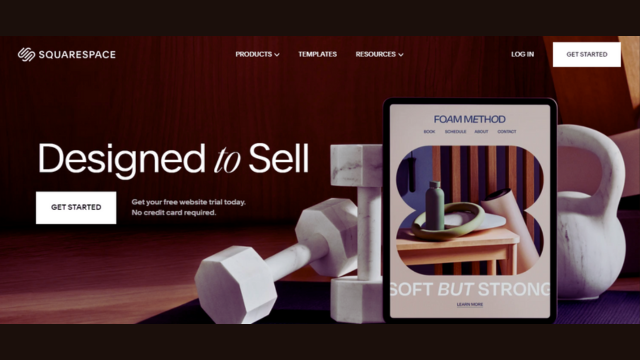
When selecting a website builder, Squarespace stands out as a premier option. It is a favourite due to its ideal interface and stylish design templates. Squarespace provides an extensive feature set that accommodates novice and expert web designers. Its all-in-one platform ensures users can build, host, and manage their websites efficiently without extensive technical knowledge.
Beautiful Design Templates
Squarespace provides an extensive collection of stunning, professionally designed templates. These templates cater to various industries, ensuring a tailored look for any website. The designs are modern, visually appealing, and fully customizable to match your brand’s identity.
User-Friendly Interface
The platform boasts a highly intuitive drag-and-drop interface, simplifying the design process. Users can effortlessly add, arrange, and customize elements without needing coding skills. It makes it accessible for beginners who want to create beautiful websites quickly.
Integrated E-Commerce Solutions
Squarespace offers robust e-commerce features for businesses wanting to sell online. It includes everything needed to set up and manage an online store, from product listings to payment processing. The integrated shopping cart and checkout process ensure a seamless customer experience.
Mobile-Optimized Websites
All Squarespace templates are mobile-responsive, ensuring your website looks great on any device. This automatic optimization means users don’t need separate mobile versions. A mobile-friendly design has two advantages: it improves search engine rankings and the user experience.
Reliable Hosting and Security
Squarespace includes hosting and security features in its subscription plans. Users benefit from fast, reliable hosting and automatic SSL certificates for secure browsing. The platform ensures that websites are protected against common threats, providing peace of mind.
Squarespace excels as a website builder by combining aesthetic design, ease of use, and powerful features. Its all-in-one approach ensures users can build professional websites without juggling multiple services. It is a top choice for anyone looking to establish a solid online presence.
Pros
1. Squarespace offers sleek and modern website templates for customization.
2. It provides integrated e-commerce functionality for online stores.
3. The platform includes built-in SEO tools to improve visibility.
4. Squarespace offers 24/7 customer support for assistance and guidance.
Cons
1. Customization options might be limited compared to other platforms.
2. Pricing plans can be relatively higher for small businesses.
3. Advanced features may require some technical knowledge to implement.
4. Migration to another platform can be challenging due to lock-in.
WordPress.com
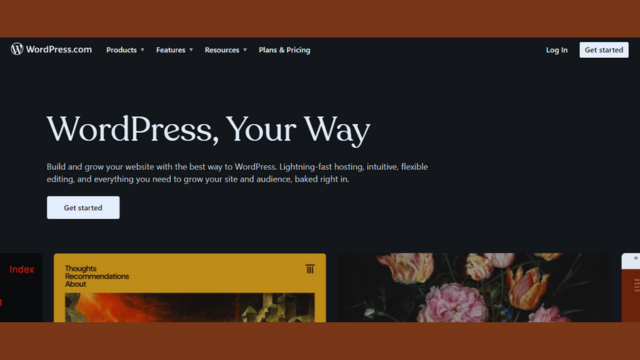
WordPress.com stands out as a versatile and robust platform for building websites. It provides many features to assist anyone in creating and maintaining an online presence, regardless of level of experience with development. WordPress.com caters to a wide range of needs. Here are five compelling reasons why WordPress.com is a top choice for website builders.
User-Friendly Interface
WordPress.com features an intuitive and user-friendly interface for all. Users can easily use the platform without any issues. The dashboard simplifies the website creation process significantly. This ease of use allows anyone to build and manage their site. Editing content is straightforward with the visual editor.
Extensive Theme Library
WordPress.com offers an extensive library of themes for customization. Hundreds of themes are available for users to select from. Every theme is expertly created and tailored to suit a range of needs. Customizing themes is simple, allowing unique branding. This variety ensures your website looks professional and tailored.
Built-In SEO Tools
WordPress.com provides built-in SEO tools to enhance your site’s visibility. The platform includes essential features to help improve search engine rankings. Users can easily optimize content with these integrated tools. This focus on SEO ensures your site attracts more visitors. Higher visibility directly translates to increased traffic and engagement.
Secure Hosting and Maintenance
WordPress.com offers secure hosting with automated updates and maintenance. Users can rest assured their site is protected from potential threats. The platform handles all technical aspects, including backups and security patches. This security focus allows users to concentrate on content creation. Reliable hosting means less downtime and more reliability.
Community Support and Resources
WordPress.com boasts a vibrant community and extensive support resources. Users can access forums, tutorials, and support from other users. This active community provides solutions and advice for common issues. Extensive documentation helps users understand the platform better. These resources ensure you’re always stuck with help.
WordPress.com remains a leading website builder due to its user-friendly interface, extensive themes, built-in SEO tools, secure hosting, and robust community support. Whether for a personal blog or a business site, WordPress.com offers everything you need to succeed online.
Pros
1. WordPress offers extensive customization through themes and plugins.
2. Users find it easy to use with its intuitive interface.
3. SEO optimization is vital, helping websites rank higher.
4. The platform supports a large community for assistance and development.
Cons
1. WordPress sites can face security vulnerabilities if not updated.
2. Users may experience slow performance due to poorly optimized plugins.
3. Customization requires coding knowledge for advanced changes.
4. Regular maintenance and updates are necessary to ensure functionality.
Shopify

Advantages of Shopify as a Website Builder Shopify stands out as a premier website builder for e-commerce businesses. Its platform combines ease of use with powerful tools tailored for online selling. Whether you’re a small business owner or managing a large enterprise, Shopify offers robust solutions that cater to various needs. Let’s delve into some key advantages that make Shopify a top choice for website building.
User-Friendly Interface
Shopify’s interface is intuitive, making it accessible for beginners. Even those without prior technical knowledge can easily navigate through its features. The drag-and-drop functionality simplifies website customization and management. This ease of use ensures a smooth experience for creating and maintaining your online store.
Extensive App Store
Shopify’s app store offers many integrations. Users can enhance their store’s functionality with various apps. From marketing tools to inventory management, the options are extensive. These integrations allow businesses to tailor their stores to specific needs. This flexibility supports growth and efficiency.
Secure and Reliable Hosting
Shopify provides ideal hosting for online stores. The platform handles security measures like SSL certificates and PCI compliance. Users can trust their data is protected from cyber threats. Shopify’s reliable hosting ensures minimal downtime, keeping your store accessible to customers.
Responsive Customer Support
Shopify offers exceptional customer support available 24/7. Users can access assistance through live chat, email, or phone. The support team is knowledgeable and responsive to issues. This constant availability helps resolve problems quickly. Adequate support ensures a smoother operation of your online store.
Comprehensive E-commerce Tools
Shopify comes equipped with comprehensive e-commerce tools to boost sales. Users can utilize features like abandoned cart recovery and SEO optimization. These tools enhance marketing efforts and improve store visibility. The built-in analytics provide insights into customer behaviour. Businesses can make wise decisions for expansion with the use of this data.
In summary, Shopify excels in delivering a user-friendly and powerful platform. Its extensive app store, secure hosting, responsive support, and e-commerce tools are significant advantages. These elements work together to provide the best possible setting for developing and managing profitable Internet businesses.
Pros
1. Shopify offers an easy-to-use interface suitable for beginners.
2. An extensive app marketplace provides various features to enhance your store.
3. Reliable and secure hosting ensures your website runs smoothly.
4. Responsive customer support assists with technical and business issues.
Cons
1. Monthly subscription costs can be high for small businesses.
2. Transaction fees apply unless using Shopify Payments for transactions.
3. Customization options are limited without advanced coding skills.
4. Integrating third-party apps can sometimes lead to compatibility issues.
Weebly
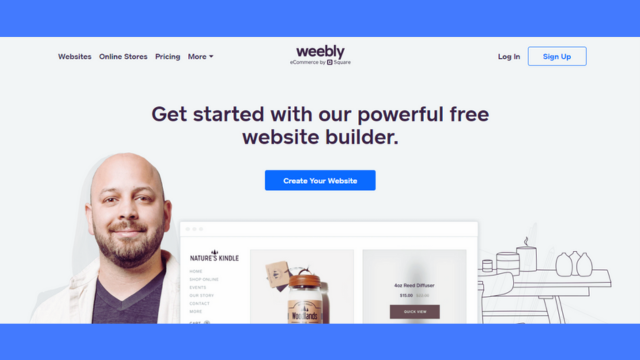
Weebly stands out as one of the most user-friendly website builders available. It caters to various users, from small business owners to bloggers, offering comprehensive features that streamline the website creation process. Its intuitive drag-and-drop interface allows users with minimal technical knowledge to build professional websites effortlessly. Let’s explore the advantages that make Weebly a popular choice among website builders.
User-Friendly Interface
Weebly offers an incredibly user-friendly interface that simplifies website creation. Its drag-and-drop functionality allows users to customize elements easily. Even those without coding skills can create appealing websites quickly. The platform’s simplicity makes it accessible to everyone.
Versatile Design Options
Weebly provides a range of versatile design options. Users can select from numerous templates tailored to various industries. These templates are customizable, ensuring each website has a unique look. Its adaptability enables users to design websites that accurately represent their brands.
Integrated E-commerce Features
Weebly includes integrated e-commerce features, making it ideal for online stores. It is easy for users to create product pages, manage inventory, and process payments. The platform supports various payment gateways, providing a seamless shopping experience. Weebly’s e-commerce tools simplify selling products online.
Mobile-Responsive Designs
Weebly ensures all its templates are mobile-responsive by default. This feature is crucial as more users access websites from mobile devices. An ideal design guarantees a consistent user experience across all devices. This adaptability enhances user satisfaction and engagement.
Comprehensive Support and Resources
Weebly offers comprehensive support and resources to assist users. Its help centre includes tutorials, guides, and community forums. Users can also access live chat, email support, and phone support. This extensive support ensures users can resolve issues and maximize Weebly’s potential.
In summary, Weebly’s ease of use, design flexibility, e-commerce capabilities, mobile responsiveness, and robust support make it a top choice for building websites. Whether you’re a beginner or an experienced user, Weebly provides the tools and resources needed to create a professional online presence.
Pros
1. Weebly’s user-friendly interface makes website building straightforward for beginners.
2. The drag-and-drop functionality simplifies the design process significantly.
3. It offers a variety of templates that cater to different needs.
4. Weebly provides integrated e-commerce tools for setting up online stores.
Cons
1. Customization options are limited compared to other website builders.
2. Advanced users may find the design options somewhat restrictive.
3. The mobile app needs some features available on the desktop.
4. Weebly’s pricing plans can be higher than some competitors’ offerings.
Hostinger
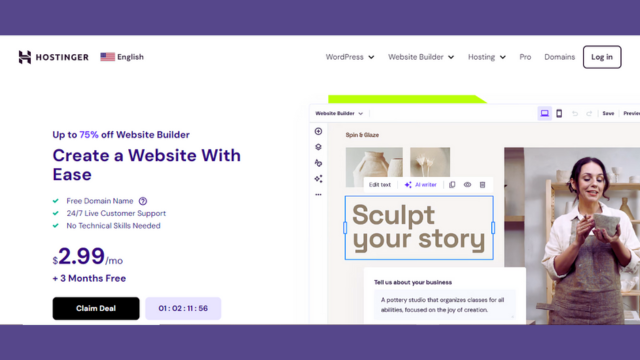
A well-known brand in the website creation industry, Hostinger provides a wide range of practical tools and features that make it create websites that are both expertly designed and visually appealing. Everyone can find the tools they need to realize their vision because it serves a diverse user base, ranging from novices to experienced web developers. Here are five key advantages of using Hostinger as your website builder software:
User-Friendly Interface
Hostinger features an intuitive interface, making website building straightforward. Users navigate effortlessly through the process, ensuring a smooth experience. The drag-and-drop functionality eliminates complexity, enhancing productivity and creativity.
Affordable Pricing Plans
Hostinger offers competitive pricing plans suitable for all budgets. Users receive high-quality services without breaking the bank. Affordable rates ensure access to premium features and reliable support, making Hostinger an economical choice.
Speed and Performance
Hostinger prioritizes speed, ensuring websites load quickly and efficiently. Speedy loading times improve search engine rankings as well as user experience. Hostinger’s optimized servers guarantee top-tier performance for all websites.
Comprehensive Customer Support
Hostinger provides extensive customer support through various channels. Users can access 24/7 live chat, email, and a comprehensive knowledge base. Support personnel are knowledgeable and accommodating and promptly and effectively handle problems.
Versatile Customization Options
Hostinger offers diverse customization options to meet unique user needs. Users can choose from many templates and design elements. This versatility allows for the creation of distinctive and personalized websites.
In conclusion, Hostinger stands out as a top website builder software with its user-friendly interface, affordable pricing, exceptional speed, robust customer support, and versatile customization options. These features make it ideal for all.
Pros
1. Hostinger offers affordable pricing for high-quality website-building services.
2. The platform provides a user-friendly interface suitable for beginners.
3. Hostinger includes free domain registration with their premium plans.
4. The software ensures fast loading speeds and reliable uptime for websites.
Cons
1. Hostinger lacks advanced customization options for experienced web developers.
2. The customer support can be slow during peak times.
3. Hostinger’s basic plan does not include daily backups.
4. The platform offers limited features compared to other website builders.
Jimdo
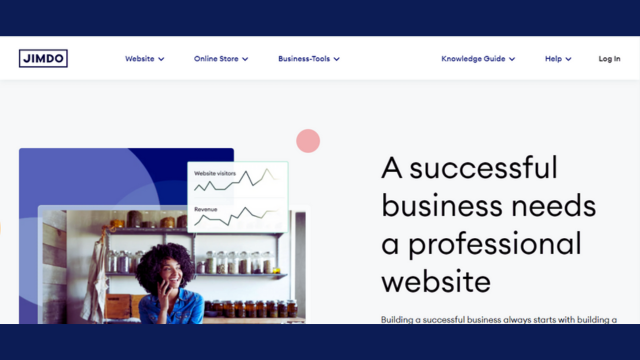
Jimdo is a famous website builder known for its user-friendly interface and versatility. It is designed to help individuals and small businesses create professional-looking websites without needing advanced technical skills. Jimdo is a popular option thanks to its array of features designed to simplify the web design process. Below are some of the key benefits of using Jimdo.
Ease of Use
Jimdo offers an intuitive drag-and-drop interface, making it accessible to beginners. Users can easily add, remove, or customize elements on their website. The platform’s simplicity ensures that anyone can build a site effortlessly.
Customizable Templates
Jimdo provides a wide selection of customizable templates suitable for various industries. A template that suits the user’s needs and style can be selected. Each template is fully responsive, ensuring a seamless experience on all devices.
Integrated SEO Tools
Jimdo comes with built-in SEO tools that help optimize your website. These tools guide users in improving their site’s search engine rankings. Better visibility on search engines can lead to increased traffic and engagement.
E-commerce Capabilities
Jimdo supports robust e-commerce features, enabling users to sell products online. Jimdo offers a simple and effective online store setup process. Moreover, the platform integrates with several payment gateways, streamlining transactions.
Affordable Pricing Plans
Jimdo offers competitive pricing plans that cater to different budgets. Whether you need a primary site or advanced features, Jimdo has a plan. Transparent pricing ensures that users get value without hidden costs.
By focusing on user-friendliness, customization, SEO, e-commerce, and affordability, Jimdo stands out as an excellent website builder. Its features are designed to meet the diverse needs of its users, making website creation a hassle-free experience.
Pros
1. Jimdo offers an intuitive and user-friendly interface for beginners.
2. The platform provides a mobile app for on-the-go website management.
3. Jimdo includes built-in SEO tools to enhance website visibility.
4. Users can quickly create online stores with its e-commerce features.
Cons
1. Customization options are limited compared to other website builders.
2. The free plan includes Jimdo branding on your website.
3. Users might need more templates compared to competitors.
4. Advanced features and flexibility require upgrading to higher plans.
BigCommerce
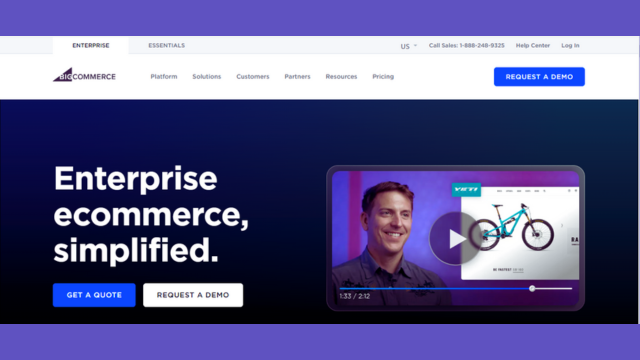
An exceptional e-commerce platform for businesses looking to launch and expand their online stores is BigCommerce. All sizes of companies, from startups to multinational corporations, can benefit from its extensive feature set and array of tools. BigCommerce combines ease of use with robust functionality, making it a preferred choice for many entrepreneurs looking to establish a solid online presence.
User-Friendly Interface
BigCommerce provides an intuitive interface that simplifies the store setup. Users can easily navigate through options and features without technical expertise. The platform’s design tools enable quick customization of the store’s look and feel.
Comprehensive E-commerce Features
BigCommerce comes equipped with all the essential e-commerce features. It supports many payment gateways and shipping options. The platform also offers advanced product management tools to enhance sales strategies.
Scalability
BigCommerce is ideal for your business needs. The platform handles high traffic and large product catalogues efficiently. Businesses can seamlessly upgrade their plans as their requirements evolve.
SEO and Marketing Tools
BigCommerce includes robust SEO and marketing tools to drive traffic. Users can optimize their store’s content for search engines quickly. The platform integrates with significant marketing services to boost online visibility.
Strong Security and Support
BigCommerce prioritizes security and customer support to ensure reliability. It provides built-in SSL certification and complies with PCI standards.
By offering these comprehensive benefits, BigCommerce enables businesses to create and maintain successful online stores. Its user-friendly approach and advanced features make it an ideal choice for all seeking growth and efficiency in their e-commerce operations.
Pros
1. BigCommerce offers a wide range of customizable templates and themes.
2. It integrates well with various third-party applications and services.
3. Users benefit from robust SEO tools to enhance online visibility.
4. The platform provides excellent customer support and detailed documentation.
Cons
1. The pricing can be high for small businesses and startups.
2. Customizing certain features may require knowledge of coding.
3. Users might experience limitations with specific design elements.
4. The learning curve can be steep for beginners new to e-commerce.
Webflow
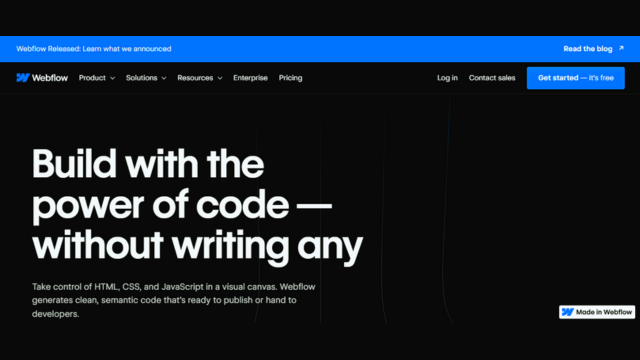
Designers, developers, and companies have come to rely on Webflow, a robust and adaptable website builder, for its rapid rise in popularity. For all users, it offers the simplicity of a drag-and-drop interface combined with custom code customization options. Webflow has many features to help you realize your vision, whether you are building a primary blog or a sophisticated e-commerce site. Let’s explore some of the standout benefits of using Webflow for your web design needs.
Design Flexibility
Webflow provides unparalleled design flexibility for users of all levels. It allows pixel-perfect designs without the constraints of templates. Every component can be altered to fit the aesthetics of your brand. Its flexibility will make your website stand out from the competition. Webflow’s design tools cater to both simple and complex projects seamlessly.
Visual Development
Webflow’s visual development interface is intuitive and user-friendly. It enables real-time design adjustments with immediate visual feedback. This approach helps designers and developers collaborate effectively. By seeing changes instantly, users can refine their designs quickly. The visual interface reduces the need for coding knowledge.
Built-in CMS
Webflow includes a powerful, built-in Content Management System (CMS). This CMS allows you to manage and update content effortlessly. It supports dynamic content types, making it versatile for various needs. The CMS integrates smoothly with the design tools, ensuring consistency. Webflow’s CMS is perfect for both static and dynamic websites.
Responsive Design
Webflow makes creating responsive designs straightforward and efficient. It offers tools to ensure your website looks great on all devices. You can customize layouts for desktops, tablets, and mobile phones. The platform previews how your site will appear on different screens. This capability ensures a seamless user experience across devices.
Hosting and Security
Webflow provides reliable hosting and robust security features for your site. The platform offers fast, scalable, and secure hosting with minimal downtime. Webflow also includes SSL certification, enhancing site security and trust. This hosting integration simplifies the process, eliminating the need for third-party services. Security updates and performance optimizations are handled automatically.
As a complete website development and management solution, Webflow stands out. Its design flexibility, visual development tools, built-in CMS, responsive design capabilities, and robust hosting make it an excellent choice for many users.
Pros
1. Webflow offers a user-friendly interface with a visual drag-and-drop builder.
2. Users can create highly customized designs without needing extensive coding skills.
3. Webflow includes powerful CMS capabilities suitable for dynamic content management.
4. The platform provides hosting services, ensuring fast and secure websites.
Cons
1. Webflow’s pricing can be high compared to other website builders.
2. Learning can be difficult for users new to web design.
3. Users may need help with template options compared to other platforms.
4. dedicated solutions are more robust than Webflow’s e-commerce features.
Duda
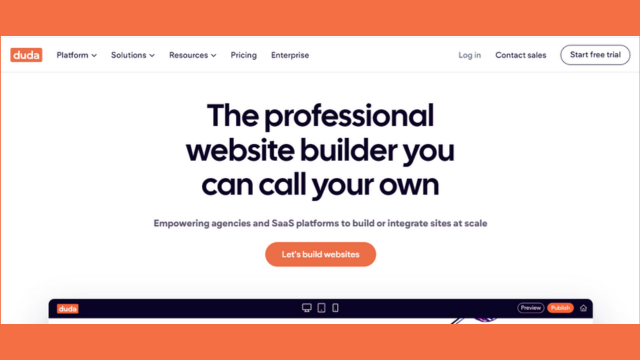
Duda has emerged as one of the top website builders, praised for its flexibility, user-friendly interface, and robust features. Its smooth approach to building business websites serves many users, from small companies to big agencies. The platform’s comprehensive toolset ensures that novices and experts can effectively achieve their web design goals.
Intuitive Drag-and-Drop Interface
Duda’s drag-and-drop interface simplifies the website-building process significantly. Users can effortlessly design websites without needing coding knowledge. This intuitive approach allows creative freedom while maintaining ease of use. The learning curve is minimal, enabling quick adaptation and productivity.
Responsive Design Capabilities
Duda excels in creating responsive websites that look great everywhere. The platform ensures your site performs well on all devices. The websites maintain aesthetics and functionality across various screen sizes with automatic adjustments.
Extensive Template Library
Duda offers an extensive library of templates suitable for diverse industries. Each template is professionally designed, providing a solid starting point. To fit the identity of their brand, users can alter these templates. This variety saves time and enhances the website’s visual appeal.
Robust Client Management Tools
Duda provides powerful client management tools for agencies and freelancers. Users can create and manage multiple client sites efficiently. The platform offers white-label solutions, enabling branded experiences for clients. These tools streamline workflows, boosting productivity and client satisfaction.
Built-In eCommerce Functionality
Duda’s built-in eCommerce features support businesses in selling products online. The platform includes tools for managing inventory, payments, and shipping. Users can easily set up and run online stores without additional software. This integrated approach simplifies eCommerce management for users.
When it comes to meeting different needs, Duda is a unique website builder. Its user-friendly interface, responsive design, and comprehensive features make it an excellent choice. Whether you’re a business owner, a freelancer, or part of an agency, Duda provides the tools necessary to create stunning, functional websites.
Pros
1. Duda offers intuitive drag-and-drop functionality, simplifying website creation.
2. The platform provides robust analytics tools for monitoring site performance.
3. Users benefit from responsive design features for mobile-friendly websites.
4. Duda includes built-in tools for SEO, enhancing search engine visibility.
Cons
1. Duda’s pricing can be higher compared to other website builders.
2. Limited third-party integrations might restrict advanced functionality for users.
3. The platform’s customization options are limited to experienced developers.
4. Customer support responses can be slow, causing potential delays in troubleshooting.
Buying Guide About Best Website Builder Software Solutions
Selecting an effective website builder software solution is essential to the success of any digital presence. There are many choices with various features and functionalities; making an informed decision may seem intimidating – let us walk through five key considerations when making such a significant choice.
Ease of Use:
The first thing you should look for in a website builder should be the user experience. Both experienced web developers and novice website creators will benefit from intuitive navigation and an effortless editing process; look for platforms offering drag-and-drop editing with customizable templates, as this can facilitate rapid website production without encountering technical barriers.
Design Flexibility:
When selecting a website builder, ensure it offers sufficient design flexibility and customization features that resonate with visitors. When considering templates, fonts, colour schemes, and layout options for personalization features like headers/footers/navigation menus that align with branding guidelines, taking control over its appearance ensures it stands out among digital clutter while making an impression statement to potential visitors.
Features and functionality:
When designing websites, user experience must always come first. When choosing website builders, focus on those offering features explicitly tailored to your requirements – these may include e-commerce capabilities, blog integration, contact forms, multimedia support tools, SEO tools, or mobile responsiveness – that meet this need. Also, keep scalability in mind to accommodate future growth while taking note of any integrations or plugins that could enhance the performance or functionality of your site.
Establishing and running a website involves multiple stages of troubleshooting and assistance, so incorporating reliable customer support services should be an integral component when selecting website builder software. Consider live chat channels, email support services, comprehensive documentation, tutorials, and community forums, which could quickly address common queries or provide advice from fellow users; having these resources readily available will expedite problem resolution while helping maximize features!
Cost and Value:
When selecting a website builder, budget considerations are an integral component. But they shouldn’t be the sole deciding factor when making an investment decision that aligns with long-term goals! Regarding features offered – including storage capacity limits, bandwidth caps, transaction fees (if applicable), etc. – and subscription plans available through specific platforms – both should be carefully considered before making this critical investment decision!
Integration Options:
In today’s interconnected digital environment, seamless integration with third-party tools and platforms is paramount to website performance and functionality. When selecting a website builder, compatibility checks against critical integrations such as email marketing services, social media platforms, analytics tools, customer relationship management (CRM) systems, and payment gateways are imperative to maximize your potential online presence! Prioritize platforms that offer multiple integration options, as this will increase your capabilities while streamlining workflow processes – this way, maximizing growth while streamlining workflow processes!
Scalability and Performance:
As your business adapts, its website should change according to traffic, content, and functionality to accommodate increased service needs. Before choosing one website builder to meet your projected growth trajectory, carefully evaluate each scalability and performance capability. As part of your evaluation, consider factors like server reliability, uptime guarantees, page load speeds, and caching mechanisms where applicable. Be on the lookout for website builders offering features to facilitate scalability, such as flexible hosting options, content delivery networks (CDNs), and automatic scaling features. Doing this ensures an uninterrupted user experience regardless of visitor traffic or resource needs fluctuations.
Securing Your Site & Protecting Data:
Ensuring the security and protection of sensitive information are of utmost importance in an ever-evolving cyber world, where cyber threats and attacks are an ever-present reality. When searching for website builders, prioritize those that offer security measures. Antivirus protection, secure payment gateways, and regular updates and backups should all be included among their security offerings to guard against threats such as malware, data breaches, or unauthorized access. Assess your platform against industry standards and regulations. Focusing on security can increase visitor trust while decreasing risks related to data breaches.
Customization and Code Access :
While website builders offer user-friendly solutions, more complex projects may require advanced customization or access to their underlying code. When selecting one that can meet your exact requirements, carefully evaluate each platform’s level of customization and code access before choosing – some offer intuitive visual drag-and-drop interfaces. In contrast, others may provide intricate customization using HTML, CSS, or JavaScript programming languages, as well as whether its plugins, widgets, or extensions go beyond their standard features; an ideal website builder provides both user-friendly customization tools as well as code access so you can build unique online presences online.
Selecting an ideal website builder requires careful consideration of multiple vital aspects, including ease of use, design flexibility, features and functionality, customer support resources, and costs/value. By prioritizing these essential factors according to your needs and goals, you can find an environment supporting professional yet engaging websites.
Website builders provide users with ongoing support and updates, offering cutting-edge technologies and security patches that keep their websites relevant in an ever-evolving digital environment. Such assistance ensures their sites remain practical and relevant within this ever-evolving digital space.
Frequently Asked Questions about Website Builder Software
Websites have become an essential tool in modern digital life for businesses and individuals, yet not all have the necessary skills or resources to design one from scratch. That is where website builder software comes into play; these tools enable users to rapidly create professional-looking sites without writing code themselves. With so many choices out there, it may take a lot of work to make an informed decision; that is why there is a list of frequently asked questions regarding top website builders’ software packages, making this decision process more manageable.
Are website-building tools suitable for creating blogs or portfolio sites?
Absolutely! Website builders offer an ideal way of quickly and efficiently building blogs, portfolios, and other content-rich sites. When selecting a builder platform, look for customizable templates with features like easy content management, social sharing options, and comment moderation. These features make website builders the ideal partner whether you are an artist displaying their works online or an experienced blogger sharing thoughts online! With one, all the tools required for an engaging online presence while maintaining a professional web presence will be at your fingertips!
Can your current website be converted into a website builder platform?
Yes.
Migrating an existing website onto a website builder platform is possible, though its complexity will ultimately depend on the timelines and capabilities of each chosen platform. Some website builders offer tools and services to facilitate migration processes, such as importing content from other platforms or domain transfers while preserving design and functionality – to make this venture successful, be sure to do your research on all platforms that offer such options in addition to reaching out to their support teams for advice or assistance before beginning such an undertaking.
How much does website builder software cost?
The cost of website builder software depends on various factors, including platform, features/services in your subscription plan, budgetary constraints, and needs. Pricing plans designed to meet different budgets and needs range from free plans with limited features to premium plans with advanced functionality and added benefits. Additional expenses like domain registration fees, hosting costs integration, or add-on requirements must all be factored into a decision when selecting one that offers value that satisfies both budgetary restrictions and needs.
Selecting an effective website builder software can have a dramatic effect on both your online presence and success. Although making this change may require extra work and adjustment if it more closely aligns with your goals and needs, switching could be worthwhile; ensure you plan and execute this transition carefully to minimize disruptions during transition periods.
By keeping these factors in mind when selecting your website builder platform, you can craft an engaging site that accurately represents your brand while meeting its goals. Whether you are an SMB owner, entrepreneur, or creative professional, one is sure to exist just waiting for you!
Final Thoughts
Finding an efficient website builder software is essential to creating an impactful online presence. Top website builders offer intuitive user interfaces, customizable templates, and powerful features explicitly tailored to individual requirements – making professional-looking digital profiles accessible without being dependent on technical experts alone.
Wix provides drag-and-drop simplicity and a selection of design options, while Squarespace stands out with stunning templates and robust e-commerce capabilities explicitly tailored for creative professionals.
WordPress.com boasts greater flexibility through extensive plugins. Webflow offers cost-effective solutions with advanced customization features and responsive design capabilities that are ideal for designers. It provides mobile-optimized websites tailored explicitly for modern users, and Jimdo delivers an efficient platform for quickly building personal and professional sites.
Furthermore:
Website builders offer users an effortless way to build professional-quality websites quickly and effortlessly without needing to learn complex coding languages. Equipped with templates, SEO tools, and responsive designs explicitly tailored for user experience across devices – website builders enable content owners to keep their site updated while having minimal maintenance requirements!
Finding the ideal website builder software depends heavily on your needs and goals. From design versatility to e-commerce functionality and ease of use – or any combination thereof – there will surely be one suitable for you and your brand! Investing in reliable website builder software is essential in today’s digital environment!
Next Article: Best Scheduling Software

